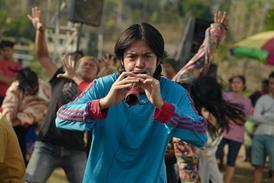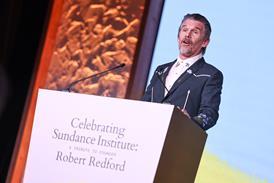Dir: Sei'ichi Motohashi. Japan. 2001. 104mins.
Located deep in a Belarus pine forest , the village of Budische was devastated when radiation from the nearby Chernobyl nuclear power station fell from the skies on April 26, 1986. Most villagers left, but when documentarian Sei'ichi Motohashi arrived in Budische in early 2000, 56 remained, nearly all of them elderly pensioners. It's the lives of those who chose to stay that forms the basis for Motohashi's remarkable film, which is now set for theatrical release in several cities in Japan. Abroad, the documentary will probably find a more hospitable home in the television and institutional markets, with the spare, elegant score by Ryuichi Sakamoto (The Last Emperor, The Sheltering Sky, Little Buddha) a sales plus. A stunning collection of black-and-white photographs taken in Budische by the director, now the basis of a tour across Japan.
Motohashi 's film takes its name from Alexei, a 34-year-old disabled man who lives in the village with his parents. He and others stayed, he says, because of a spring that has remained miraculously free of radiation, refreshed by what the villagers claim is "100-year-old rain water."
Alexei's Spring is less concerned with remembering the Chernobyl disaster - there is not one shot of a smoking reactor or children dying in hospital - than with presenting the people of Budische as they are today, minus the usual ideological agendas or journalistic slants. Some may criticise the film for prettifying a grim reality, but audiences are more likely to welcome its story of the villagers' resilience, even humour, in the face of disaster, as well as their now-fashionable devotion to family and community.
The film records the life of the village through the seasons, beginning with the potato harvest and centring on the summer project of five elderly men to repair the timbers than line the spring, using only hand tools and skills gained from decades of experience. Motohashi's camera records unobtrusively, with a sharp eye for the revealing detail or comment. The villagers speak to the camera freely and naturally, with little of the self-consciousness of the typical talking-head interview. (A scene in which Alexei's parents look back on the marriage, with the mother berating the flustered father for his past infidelities, is a particularly noteworthy example.) They have much to tell us about not only coping with adversity, but what we need to live in the world. The wonders of technology, it turns out, are less important than the values communism spent the better part of seven decades trying to eradicate. But even Budische, the film warns us, cannot indefinitely overcome technology's horrors.
Prod co/Jap dist/int'l sales: Sosna Film
Prod: Tokio Komatsubara, Sadako Kamiya
Cinematography: Masafumi Ichinose
Music: Ryuichi Sakamoto
Ed: Masaru Muramoto

















No comments yet